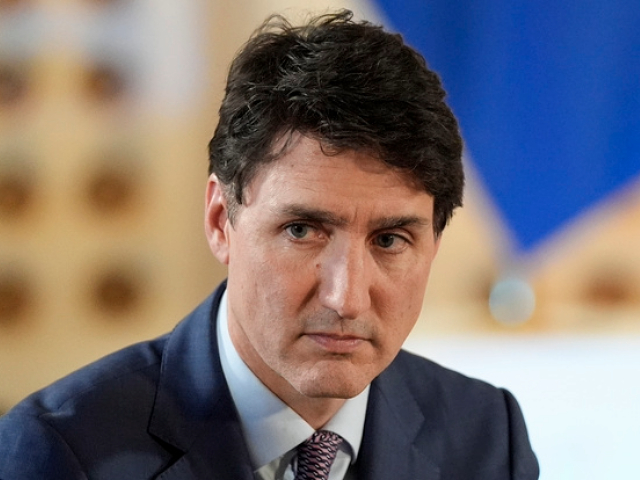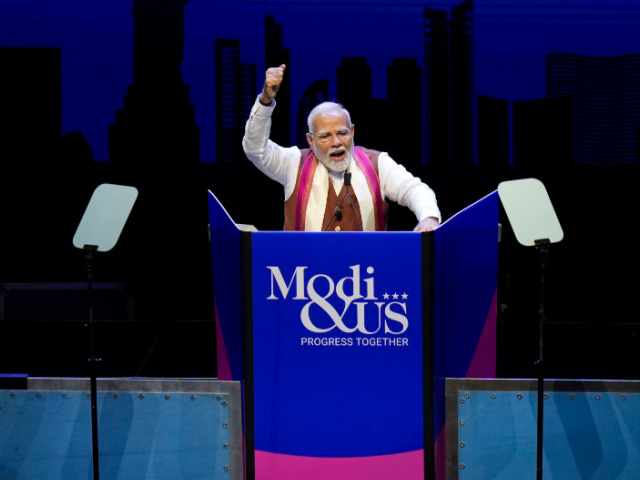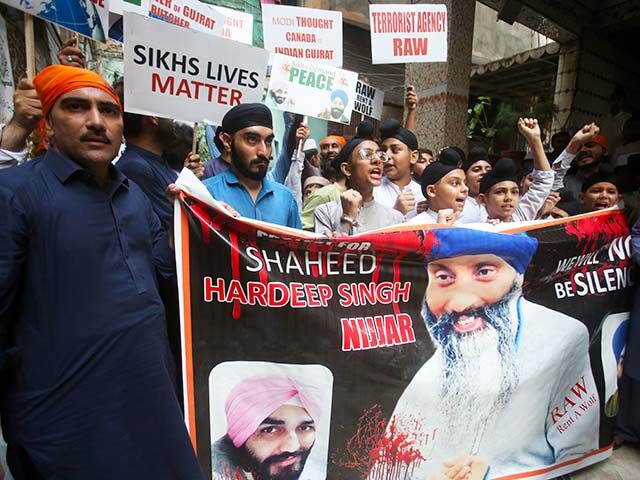Canadian Prime Minister Justin Trudeau admitted on Wednesday that his government has no “hard evidence” to prove Indian agents were behind the killing of Sikh separatist Hardeep Singh Nijjar in Vancouver in June 2023.
Trudeau made his comments before the Canadian Foreign Interference Commission, which was established in 2023 amid a wave of allegations that foreign governments such as China and Russia were interfering in Canadian politics.

Canada’s Prime Minister Justin Trudeau attends the Partnership for global infrastructure and investment event at the G7 summit on June 13, 2024, in Borgo Egnazia, Italy. (AP Photo/Alex Brandon)
In September 2023, Prime Minister Trudeau publicly accused the Indian government of masterminding the assassination of Nijjar, a leading figure in the Khalistan movement of Sikh separatists.
India, which regards the Khalistan movement as a terrorist organization, dismissed Trudeau’s allegations as “absurd” and said he offered no evidence to back them up. A major diplomatic feud erupted between India and Canada over the ensuing year. On Monday, each country expelled six of the others’ diplomats.
Trudeau has resisted calls to reveal his evidence of India’s involvement to the public. He told the Foreign Interference Commission on Wednesday that he does not have any “hard evidence,” only “intelligence” that suggests the order to kill Nijjar came from New Delhi.
“Over the course of summer, I was apprised by intelligence services that the [Indian] government was involved in the killing of Nijjar. There was not an obvious immediate international nexus,” he said.
Trudeau said that by August of 2023, “intelligence from Canada and the Five Eyes made it clear that India was involved.” The Five Eyes intelligence partnership includes Australia, Canada, New Zealand, the United Kingdom, and the United States.
Trudeau said he was convinced that “agents from India were involved” in Nijjar’s murder, and he duly expressed those concerns to the government of Indian Prime Minister Narendra Modi.
“India undermined our government and governance,” he charged. “These were clear indications that India had violated our sovereignty.”

Narendra Modi, Prime Minister of India, speaks at an event in Uniondale, New York. on September 22, 2024. (AP Photo/Seth Wenig)
“India’s response to our investigation was to double down on attacks against our government,” he complained.
Trudeau repeated his administration’s accusation that Modi’s government was collecting information on opponents who live in Canada and then contracting “criminal organizations like the Lawrence Bishnoi gang” to perpetrate “violence against Canadians.”
“We wanted to question Indian diplomats but they did not waive their diplomatic immunity which is why we had to ask them to leave,” he said, referring to Monday’s expulsion of diplomats.
Lawrence Bishnoi is a 31-year-old gang boss who has been imprisoned in India since 2015. Canadian police claim Bishnoi is still directing his international network from prison, including violent attacks on leaders of the Khalistan movement.
Bishnoi certainly acts like he is still running an international crime syndicate from jail. He once threatened to have a Bollywood actor killed during a press conference on the steps of a courthouse. Last March, he managed to give two media interviews from inside a high-security prison in Punjab without prison authorities having a clue that he was entertaining reports.
“He runs his gang seamlessly from prison without needing to coordinate everything. Unlike other gangsters confined to a region, he thinks big,” a senior Punjabi police officer remarked to the BBC this week.
The Indian Foreign Ministry on Thursday complained that Canada has failed to take action against the Bishnoi gang despite India’s repeated requests.
Foreign Ministry spokesman Randhir Jaiswal suggested there was a “political motive” behind Canada’s failure to act. He said India has 26 extradition requests pending with Canada, some of them several years old.
Jaiswal also referenced Trudeau’s admission that no hard evidence about the Nijjar murder has been shared with the Indian government.
“We have made our position very clear on this particular matter. You would have seen that several press releases have been issued in the last two days putting out our position, which we are very clear, that since September of 2023, the Canadian government has not shared any shred of information with us,” he said.
Jaiswal rejected Trudeau’s claim that six Indian diplomats were expelled from Canada because they would not relinquish diplomatic immunity to answer questions about their possible involvement in Nijjar’s killing.
“We have withdrawn our diplomats before Canada took any step. Canada did not share a shred of evidence with India before making claims against the Indian High Commissioner and other diplomats,” he said.
“We reject false implications against our diplomats. Canada has not shared any evidence with us,” he concluded.

COMMENTS
Please let us know if you're having issues with commenting.